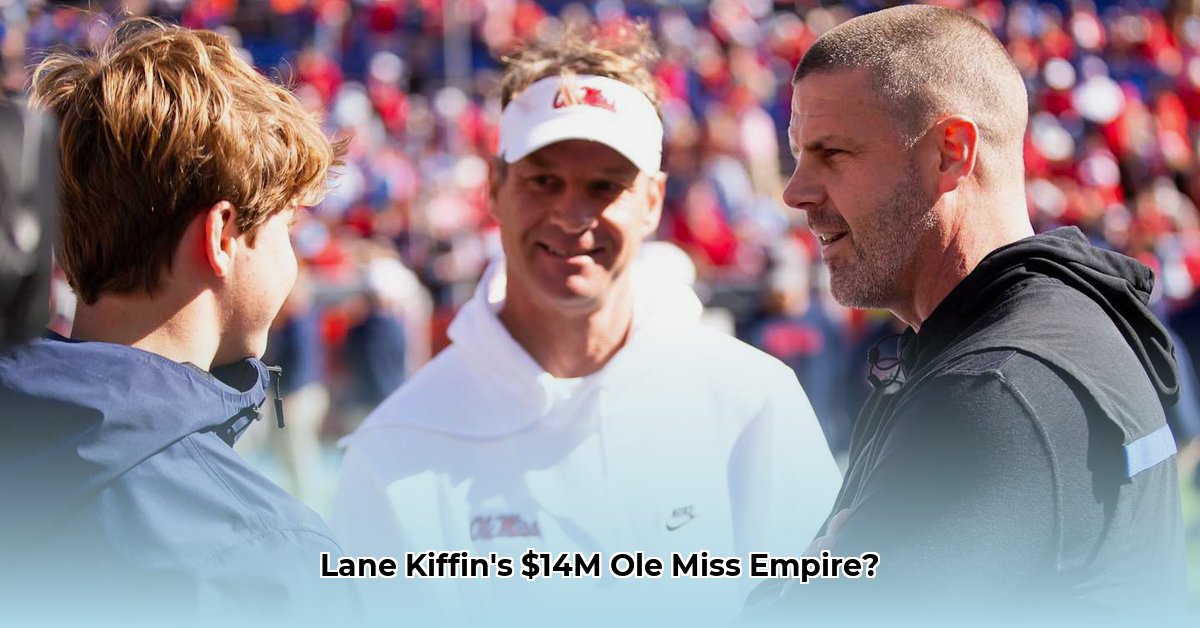
Lane Kiffin Net Worth: The Ole Miss Coach's Millions
Lane Kiffin. The name evokes images of high-stakes college football, nail-biting victories, and perhaps a few controversies. But beyond the gridiron drama lies a compelling financial narrative. With an estimated net worth of $14 million in 2025, Kiffin's success transcends coaching wins; it reflects his shrewd navigation of the lucrative world of college sports. Let's explore the details of his financial journey.
From Controversies to Cash: A Coaching Career's Financial Trajectory
Kiffin's path to millions hasn't been linear. His brief, tumultuous tenure as head coach of the Oakland Raiders, while a setback, appears to have fueled subsequent successes. His roles at Tennessee, USC, and now Ole Miss demonstrate resilience and a knack for program revitalization. Each successful season translates to a larger paycheck, highlighting college football's "win-big-get-paid" dynamic.
His current $9 million annual salary at Ole Miss underscores the escalating value of elite coaching talent. This is a significant increase from his earlier years, showcasing the potential for exponential growth in this high-pressure profession. It’s not just coaching skill; it's about negotiating lucrative contracts and building a powerful brand.
How much of his success is due to skillful negotiation, and how much is due to consistent on-field success? It's a compelling question that highlights the interconnectedness of Kiffin's financial achievements and his coaching record.
Beyond the Salary: Diversified Income Streams
While his Ole Miss salary forms the core of his wealth, it's likely not the entire picture. Successful coaches often diversify their income. Endorsements, public speaking engagements, and shrewd investments likely contribute significantly to his net worth. Although details remain private, these additional streams represent a considerable portion of his overall fortune.
Kiffin’s wealth isn't solely based on annual earnings; it’s the product of a carefully cultivated career, smart financial choices, and strong brand recognition. This exemplifies the entrepreneurial spirit increasingly prevalent among top college coaches.
The High-Stakes Gamble: Risk and Reward in Coaching
The coaching world is a rollercoaster. Big wins lead to bigger paydays, but setbacks can be devastating. Kiffin's career, with its highs and lows, exemplifies this inherent volatility. One disappointing season could lead to dismissal, dramatically impacting earning potential. This unpredictability makes his financial success all the more impressive.
He’s shown remarkable ability to overcome adversity and use setbacks to propel himself to greater success. This resilience showcases his skills not only as a coach but as a perceptive businessman. What strategies does he employ to mitigate the inherent risks of the coaching profession? This is a key question for aspiring coaches.
Projecting the Future: Kiffin's Financial Trajectory
Predicting Kiffin's future is challenging, particularly in the unpredictable world of college football. Continued success at Ole Miss will likely lead to larger contract renewals, further increasing his net worth.
However, a return to the NFL, while risky, could dramatically alter his earning potential. Conversely, a downturn in Ole Miss's performance could negatively impact his income. This illustrates the constant risk inherent in his profession—a risk he seems willing to embrace.
The Broader Context: College Sports Finances
Kiffin's financial journey reflects a larger trend: escalating financial stakes in college sports. Coaching salaries are skyrocketing, raising questions about the model's sustainability. Are these salaries justified by revenue? Are regulatory changes needed? These are crucial questions for the future of college football.
“The current compensation model for college football coaches is unsustainable in the long term unless there is greater transparency and accountability in the use of athletic department funds,” says Dr. Patricia Williams, Professor of Sports Economics at the University of California, Berkeley.
How to Negotiate a College Football Coaching Contract Like Lane Kiffin
Key Takeaways:
- Kiffin's success stems from offensive innovation, use of the transfer portal, and a proactive approach to NIL (Name, Image, and Likeness) opportunities.
- His compensation reflects his market value and rising financial stakes in college football.
- Understanding the coaching market dynamics, including player development and NIL, is crucial for successful negotiations.
- Kiffin’s career highlights the risk and reward inherent in coaching.
Kiffin's Financial Acumen: A Masterclass in Negotiation
Kiffin's success isn't just luck; it's the product of calculated strategies and deep understanding of the college football landscape. He's not just a football coach but a skilled businessman. His salary reflects his value, a testament to his negotiation prowess.
Strategic Steps to Success: Deconstructing the Kiffin Contract
Negotiating a contract like Kiffin's involves a multi-faceted approach:
Know Your Worth: Thoroughly research comparable salaries before negotiations. Kiffin understands his market value.
Leverage Your Brand: Kiffin has a strong brand, enhancing his negotiating power. This brand recognition is attractive to both fans and recruits.
Negotiate Beyond Salary: Negotiate for bonuses, recruiting stipends, and influence over staff hiring. Consider the implications of NIL deals.
Master the Transfer Portal: Kiffin's success with the transfer portal significantly boosts his negotiating leverage.
NIL Strategy: Incorporate provisions facilitating and supporting player NIL deals, enhancing the program's and the coach's attractiveness.
Long-Term Vision: Consider the program's and your career's future trajectory. A strong contract allows for growth opportunities.
Seek Legal Counsel: Consult with a skilled sports lawyer to protect your interests.
Risks and Rewards: Navigating the Coaching Landscape
Pros:
- High Earning Potential: Top coaches command multi-million dollar contracts.
- Brand Recognition: Successful coaches build strong brands, leading to endorsement opportunities.
- Influence and Power: Coaches wield significant influence within their programs.
Cons:
- Job Insecurity: Coaching careers are often unpredictable.
- Public Scrutiny: High-profile coaches face constant media attention.
- Intense Pressure: The pressure to win is immense.
Kiffin's career embodies this balancing act. His success is impressive, but his path is not without challenges. He's a master strategist, adapting to the ever-changing landscape. His approach provides a model, but it must be tailored to individual circumstances. For aspiring coaches, learning from his successes and assessing the risks is crucial for a rewarding and sustainable career.